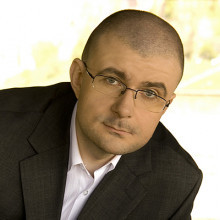Polish literature

Jacek Dukaj
Jacek Dukaj (b. 1975) is a fiction writer, essayist, translator and literary critic. His genres include science fiction, fantasy and cyberpunk.
In his first published novella, Xavras Wyżryn (1997), Dukaj wrote an alternate history of Poland. His subsequent books, e.g. Black Oceans [Czarne oceany], Extensa, Other Songs [Inne pieśni] proved his mastery of various fantasy conventions.
In his fiction Dukaj with extraordinary ease conjures up entire worlds complete down to minute details, based on coherent philosophical and scientific premises. Sometimes he creates those worlds merely by way of thought experiment. In Other Songs, for instance, he ventured to demonstrate what the world would look like, were the ancient Greek philosophers right regarding its nature and mechanics. More often, however, the author uses his inventiveness to ponder over possible consequences of the development of civilization and human evolution (in An Ideal Imperfection [Perfekcyjna niedoskonałość], a novel set in 29th century, he describes, among other things, post-human beings).
Dukaj’s prose stands out for its memorable protagonists: usually they are individuals who play a major role in the history of their respective communities, even though they themselves are far from unblemished, and are often caught up in an inner struggle, like Hieronim Berbelek from Other Songs or Benedykt Gierosławski from Ice [Lód].
Books by Jacek Dukaj are equally popular with those who look for well-told stories and with those whose primary interest are the writer’s anthropological and philosophical ideas.
Dukaj has never shied away from engaging in other cultural activities and collaborations. Based on his short story The Cathedral, Tomasz Bagiński made the animated film nominated for the Academy Award for Best Animated Short Film, while the novel The Old Axolotl [Starość aksolotla] inspired the Netflix-produced series Into the Night. In 2017 Dukaj presented Polish readers with a new translation of Joseph Conrad’s Heart of Darkness. According to the critic Jakub Bożek: “Dukaj has extracted from Conrad’s novella its very raw gist, the essence of the physical experience of Congolese jungle: its humidity, its temperature, its dull laziness, its onslaught on the senses and mind, and finally the creeping menace.” In 2022 the writer established a company with a view to develop games based on his fiction. The first production of the Nolensum Studio will be Hardware Dreams, developed around The Old Axolotl.
Jacek Dukaj is a multiple laureate of the Janusz A. Zajdel Award. His novel Ice [Lód] was longlisted for the Angelus Central European Literature Award and the Nike Literary Award. It won the European Union Prize for Literature and the Kościelski Prize. In 2023 he received the award conferred by the European Science-Fiction Society for the category “Best Author.”
BIBLIOGRAPHY
- Xavras Wyżryn, SuperNOWA, 1997
- W kraju niewiernych, SuperNOWA, 2000
- Czarne oceany, SuperNOWA, 2001
- Extensa, Wydawnictwo Literackie, Kraków 2002
- Inne pieśni, Wydawnictwo Literackie, 2003
- Katedra, ilustracje T. Bagiński, Wydawnictwo Literackie, 2003
- Xavras Wyżryn i inne fikcje narodowe, Wydawnictwo Literackie, 2004
- Perfekcyjna niedoskonałość, Wydawnictwo Literackie, 2005
- Lód, Wydawnictwo Literackie, 2007
- Córka łupieżcy, Wydawnictwo Literackie, 2009
- Wroniec, Wydawnictwo Literackie, 2009
- Król Bólu, Wydawnictwo Literackie, 2010
- Starość Aksolotla, Allegro, 2015
- Po piśmie, Wydawnictwo Literackie, 2019
- Imperium chmur, Kraków: Wydawnictwo Literackie, 2020
TRANSLATIONS TO OTHER LANGUAGES
English:
- The Old Axolotl [Starość aksolotla], transl. Stanley Bill, Edicion Kindle, Allegro, 2015
- Ice [Lód], transl. Ursula Phillips, Londyn: Head of Zeus, 2025
Bosnian:
- Led [Lód], transl. Zorana Perić, Sarajewo: Agarthi Comics, 2021
Bulgarian:
- Drugi pesni [Inne pieśni], transl. Sylwia Borisowa, Sofia: Colibri, 2015
- Лед [Lód], transl. Wera Dejanowa, Sofia: Ерго, 2017
Czech:
- Led [Lód], transl. Michaela Benešová, Brno: Host, 2021
French:
- La vieillesse de l'axolotl [Starość aksolotla], transl. Caroline Raszka-Dewez, Paryż: RIVAGES, 2024
Spanish:
- La catedral [Katedra], transl. A. Serraller Calvo, Meksyk: Ciudad de México, 2022
Macedonian:
- Мраз [Lód], transl. Filip Dimiewski, Skopje: Begemot, 2013
Russian:
- Иные песни / Inye pesni [Inne pieśni], transl. Sergìj Valerìjovič Legeza, Moskwa: AST, 2014
Slovenian:
- V deželi nevernikov [W kraju niewiernych], transl. Jana Unuk, Vnanje Gorice: Kulturno-umetniško društvo Police Dubove, 2021
Ukrainian:
- Kriga Č. 1-2 [Lód 1-2], transl. Andrìj Pavliŝin, Lviv: Astrolabia, 2018
- Kriga. Č. 3-4 [Lód 3-4], transl. Andrìj Pavliŝin, Lviv: Astrolabia, 2018
- V krai︠u︡ nevirnykh / В краю невірних [W kraju niewiernych], transl. Andriĭ Pavlyshyn, Lwów: Астролябія, 2021
Hungarian:
- Extensa [Extensa], transl. Mihályi Zsuzsa, Budapeszt: Typotex, 2012
- Zuzanna és a világmindensé [Córka łupieżcy], transl. Mihályi Zsuzsa, Budapeszt: Typotex, 2012
- Más dalok [Inne pieśni], transl. Mihàlyi Zsuzsa, Budapeszt: Typotex, 2015
- Érkezés a sötétségbe: hardware dreams [Starość aksolotla], transl. Zsuzsa Mihályi, Budapeszt: Gabo, 2021
Italian:
- Gli imperi tremano [Xavras Wyżryn], transl. Francesco Annicchiarico, Massa: Transeuropa, 2012
- La Cattedrale [Katedra], transl. Marco Valenti, Justyna Kulik, Milan: Editioni Voland, 2013